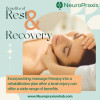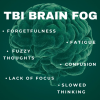Concussions are a type of brain injury that is caused by head trauma. It can be caused by a bump, blow, or jolt to the head or by a hit to the body that causes the head and brain to move rapidly back and forth. This sudden movement can cause the brain to bounce around or twist in the skull, creating chemical changes in the brain and sometimes stretching and damaging brain cells.
While concussions may be labeled as a mild brain injury, they are still serious and can have lasting effects.
Symptoms of a concussion include can be subtle and may not show up immediately. They can last for days, weeks or even longer.
Signs and symptoms of a concussion may include:
- Headache
- Ringing in the ears
- Nausea
- Vomiting
- Fatigue or drowsiness
- Blurry vision
- Concentration and memory complaints
- Irritability and other personality changes
- Sensitivity to light and noise
- Sleep disturbances
- Psychological adjustment problems and depression
- Disorders of taste and smell
Other signs and symptoms of a concussion include:
- Confusion or feeling as if in a fog
- Amnesia surrounding the traumatic event
- Dizziness or “seeing stars”
A witness may observe these signs and symptoms in the concussed person:
- Temporary loss of consciousness (though this does not always occur)
- Slurred speech
- Delayed response to questions
- Dazed appearance
- Forgetfulness, such as repeatedly asking the same question
Symptoms in children
- Dazed appearance
- Listlessness and tiring easily
- Irritability and crankiness
- Loss of balance and unsteady walking
- Excessive crying
- Change in eating or sleeping patterns
- Lack of interest in favorite toys
- Vomiting
- Seizures
Unfortunately, there are many myths surrounding causes and care for concussions that make it difficult for people to distinguish between fact and fiction.
To Suffer a Concussion, You Must Lose Consciousness
While losing consciousness after suffering a blow to the head does indicate that a person has suffered from a concussion, it is possible to suffer from one without losing consciousness at all. According to the University of Pittsburgh Medical Center, only around 10 percent of concussions include loss of consciousness. Additionally, loss of consciousness is not an indicator that the concussion was more severe.
Concussions Are Only Caused by a Direct Hit to the Head
Contrary to popular belief, you don’t necessarily need to suffer an impact directly to your head in order to experience a concussion. Although concussions can be the result of a direct blow to the head in contact sports, they can also occur in non-contact sports and everyday activities. They can also be caused by an abrupt bump or jolt to the body that shakes the head, like whiplash in a car crash or a fall down the stairs.
Wearing a Helmet Will Prevent Concussions
While wearing a helmet will reduce your risk of a concussion, it will not guarantee that you will never get one. Helmets are designed to protect against traumatic brain injury (TBI) caused by a blow to the head, but they may not be able to prevent milder forms of TBI like concussions. This is because concussions are caused by the head moving rapidly back and forth, which can cause the brain to move inside the skull and cause damage. Wearing a helmet can help reduce this movement and thus reduce your risk of getting a concussion, but it cannot completely eliminate it. There is no “concussion-proof” helmet.
You Should Wake Someone With a Concussion Every Few Hours So They Do Not Lose Consciousness
While you should check on an individual within the first four hours, but after that, the risk of a more serious brain injury passes after roughly four hours. After the four hours pass, those who have suffered from a concussion should rest, sleep and try to conserve their energy for the next 48-72 hours. Continuously waking up a person with a concussion does not allow the brain to fully rest. Rest is the best treatment for a concussion. The brain needs to shut down and recover from the injury. When resting, it is also important that one maintains their normal sleep patterns.
Pupils Must be Dilated
Dilated pupils are not a dependable sign that someone has suffered from a concussion, especially when both pupils are equally dilated. Pupils can become dilated when the autonomic nervous system’s sympathetic branch is stimulated, and the fight or flight response is triggered. This can happen when the body is under stress due to excitement, nervousness or anxiety.
However, if one pupil is more dilated than the other, that could be a sign that there is a structural brain injury and immediate medical attention is required.
Only Athletes Suffer From Concussions
While athletes are certainly more likely than non-athletes to suffer from concussions due to their increased exposure to physical activity and contact sports, anyone can suffer from a concussion under any circumstances if they receive a hard enough blow or jolt to the head or body. This means that anyone—athlete or not—could potentially experience this type of traumatic brain injury if they are involved in an accident or other incident that causes them harm.
Pain Medication Should Never be Given After a Concussion
Over-the-counter acetaminophen (Tylenol) can be recommended to help reduce pain associated with a concussion, but it should not be given until four hours after the concussion due to the rare possibility of a brain bleed. Ibuprofen and Aleve should not be taken on the first day, on the side of caution, as they may increase the risk of bleeding. If a headache continues after two weeks, it is recommended to return to your doctor. Opioids should never be used to treat concussions.
You Don’t Have to See a Doctor If You Get a Concussion
This could not be further from the truth! If you suspect you or someone else has suffered a concussion, you should seek medical attention right away. While mild concussions may heal on their own over time with rest and treatment at home, more serious cases may require medical intervention and even hospitalization. It is always best to err on the side of caution when it comes to head injuries.
Despite the misunderstandings surrounding them, concussions are very serious and potentially life-threatening injuries that cannot be taken lightly. It is important to always take the necessary steps to reduce any risks around sports activities or recreational activities that may lead to a head injury. If a concussion is suspected, it is important to get professional medical attention right away and follow any advice given by the healthcare provider. Even after symptoms have subsided, rest and careful monitoring should still be considered as the best way back to full health.
For more information on brain injuries, visit www.neuropraxisrehab.com.
Resources:
https://www.cdc.gov/headsup/basics/concussion_whatis.html
https://www.michiganmedicine.org/health-lab/8-common-misconceptions-about-concussions
https://www.mayoclinic.org/diseases-conditions/concussion/symptoms-causes/syc-20355594
https://www.concussion.org/news/concussion-myths-debunked/
https://blog.uvahealth.com/2019/03/19/concussion-myths-vs-facts/



